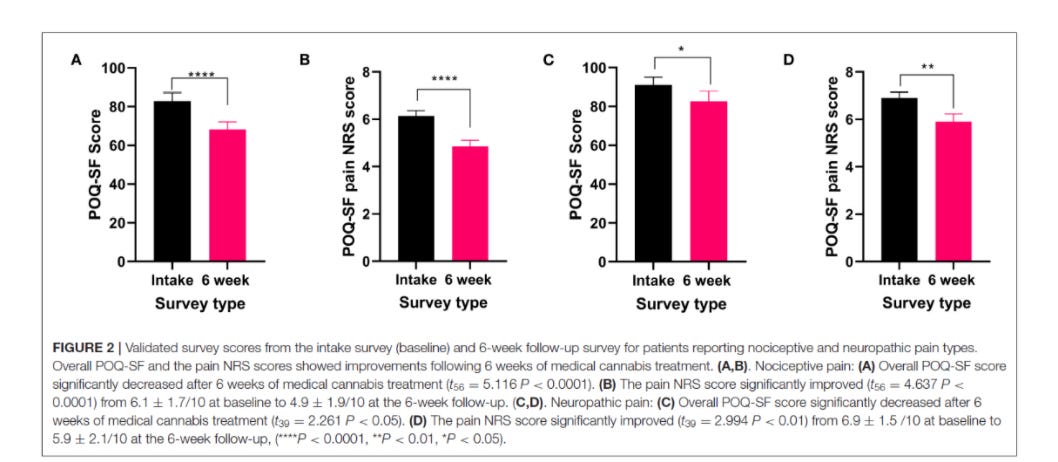Evaluation of Patient Reported Safety and Efficacy of Cannabis From a Survey of Medical Cannabis Patients in Canada
Written by Dr.Meenu Minhas, Science Writer for Medical Affairs and Dr. Stephanie Lunn, Director Medical Affairs, of Aurora Cannabis Inc.
Medical cannabis is increasingly used by Canadians, and patients around the world, to treat a broad range of medical conditions. This has led to an increasing need to seek scientific evidence about the effectiveness of medical cannabis. This article summarizes the findings of Cahill et al.1, a study which evaluated patient reported safety and efficacy of medical cannabis for a broad range of medical conditions:
recurring pain
post-traumatic stress disorder
sleep disorders
arthritis/other rheumatic disorders
anxiety
In Cahill et al.’s study, newly registered medical cannabis patients were surveyed prior to and six weeks after initiating medical cannabis treatment. Data was captured about the potential impact of medical cannabis on patient-reported quality of life, recurring pain, and various outcomes related to their primary medical condition using validated questionnaires. The results for each of the medical conditions examined are summarized below.
Recurrent pain (Figure 1 and 2). Approximately, 86% of all patients reported having recurring pain. Within these individuals nociceptive (31%) and neuropathic (22%) pain were the most common. Overall, there was a reduction in self-reported pain symptoms and an increase in quality of life following six weeks of medical cannabis treatment. Similar reductions in pain were also observed in those reporting only nociceptive or neuropathic pain. Of those who rated cannabis as being helpful for recurring pain, 33% selected high CBD products, 31% selected high THC products and 11.6% selected balanced THC:CBD products as being helpful.
Anxiety (Figure 3). Of those patients indicating anxiety as their primary medical condition, 85% reported some improvements in their anxiety following medical cannabis treatment. Although there were significant improvements in quality of life, there were no changes in anxiety scores following six weeks of cannabis treatment. Of those who rated cannabis as being helpful for anxiety, 32% of patients selected high CBD products, 28% selected high THC products, and 8% selected balanced THC:CBD products as being helpful.
Post-traumatic stress disorder (PTSD; Figure 4). Of those patients indicating PTSD as their primary medical condition, 81% reported some improvement in their PTSD symptoms following medical cannabis treatment. Likewise, there was a significant improvement in PTSD symptoms and quality of life following six weeks of medical cannabis treatment. Of those who rated cannabis as being helpful for PTSD, 12% selected high CBD products, 40% selected high THC products, and 20% selected balanced THC:CBD products as being helpful.
Arthritis or other rheumatic disorder (Figure 5). Of those patients indicating arthritis or rheumatic disorder as their primary medical condition, 62% reported some improvements following medical cannabis treatment. There were significant improvements in pain and global activity, as well as a trend towards improved quality of life following six weeks of cannabis treatment. However, no changes in overall condition were observed. Of those who rated cannabis as being helpful for their arthritis or rheumatic disorder, 53.3% selected high CBD products, 20% selected high THC products, and 20% selected balanced THC:CBD products as being helpful.
Sleep disorder (including restless leg syndrome; Figure 6). Of those patients indicating sleep disorder as their primary medical condition, 93% reported some improvement in their sleep disorder following medical cannabis treatment. This was accompanied by a significant improvement in sleep following six weeks of medical cannabis treatment, but no changes in self-reported quality of life. Of those who rated cannabis as being helpful for their sleep disorder, 25% selected high CBD products, 38% selected high THC products, and 16.7% selected balanced THC:CBD products as being helpful.
Side effects. Overall, the side effects were mild. The four most frequently reported side effects included dry mouth (22%), sleepiness (15%), restlessness (7%), and decreased memory (7%).
Overall, the current set of results found that patients reported significant improvements in recurring pain, PTSD, and sleep disorders following six weeks of medical cannabis treatment. With respect to arthritis and other rheumatic disorders, the findings were more nuanced in that patients reported improvements in pain and global activity, but no changes in their overall condition.
The results of this study provide real world scientific evidence for healthcare practitioners to consider when prescribing medical cannabis.
Reference: Cahill SP, Lunn SE, Diaz P and Page JE. (2021). Evaluation of Patient Reported Safety and Efficacy of Cannabis from a Survey of Medical Cannabis Patients in Canada. Front. Public Health 9:626853. doi: 10.3389/fpubh.2021.626853.









